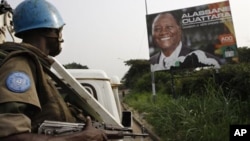The African Union mediator to Ivory Coast's political crisis says the incumbent president's decision to accept negotiations does not include the option of a power sharing government. African officials insist he must yield power.
The Economic Community of West African States says Ivory Coast's incumbent President Laurent Gbagbo has agreed to further talks without preconditions and will lift his blockade of the hotel where Alassane Ouattara has been living since the electoral commission named him the winner of November's vote.
Mr. Gbagbo agreeing to those negotiations does not change West African demands that he ultimately give up power. And the African Union mediator to this crisis, Kenyan Prime Minister Raila Odinga, says he has made clear to Mr. Gbagbo that there will be no power sharing deal.
"When people lose elections, they want to take to power in the hopes that they can negotiate a kind of power-sharing arrangement with their opponent. And I did tell him that that option is not available here," he said.
Mr. Odinga took part in a power-sharing deal in Kenya to end post-election violence. He says the legacy of that deal, and a similar deal in Zimbabwe, has not been positive. "We do not want to see a perpetuation of this experiment. It is not a way of advancing [the] African democratization process. People go to elections so there can be winners and losers. And losers must accept the verdict of the people," he said.
Mr. Gbagbo insists he won the election because Ivory Coast's constitutional counsel annulled as fraudulent nearly ten percent of all ballots cast. The United Nations certified results that show Mr. Ouattara winning the vote - an outcome that is endorsed by West African leaders, the African Union, the European Union, and the United States.
Mr. Gbagbo has been using state-run television to portray near-unanimous international support for Mr. Ouattara as evidence of a plot against the Gbagbo government.
Mr. Odinga says he believes Mr. Gbagbo now sees that his options are limited. "Both men realize of course that they are negotiating from different positions. Mr. Gbagbo realized that grandstanding will not do at this moment in time. So progress has been made and we are sure that we are going to be able to close the gap between the two camps," he said.
West African leaders are still threatening to use military force to oust Mr. Gbagbo if talks fail. But he is backed by the national army, so a fight for control of Abidjan would be costly.
African Union Mediator Says No Power Sharing Deal in Ivory Coast




